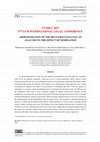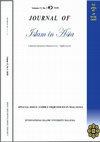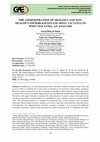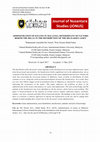Papers by wan noraini mohd salim
Mashi Publication Sdn. Bhd., 2016

Family dispute is one of the issues that occur in the administration of the deceased’s estate. Su... more Family dispute is one of the issues that occur in the administration of the deceased’s estate. Such dispute may happen at any stage in estate administration, ranging from the application of letters of representation until the distribution of the deceased’s asset. The occurrence of family dispute tends to adversely affect the administration and may lead to delay in the distribution which at the same time, rendered the process incomplete. Despite the seriousness of family dispute in estate administration, there is however, no specific method in resolving family dispute apart from the litigation process. Litigation is considered unsuitable in this case due to its inability to address the emotional grief suffered by the parties in addition to its time consuming and relatively expensive cost. Mediation on the other hand, is seen as a potential dispute resolution mechanism thanks to its effective method in addressing the core issues in family dispute. This paper addresses the overview of ...

Administration of estate refers to a process of managing and distributing the deceased’s estate t... more Administration of estate refers to a process of managing and distributing the deceased’s estate to the beneficiaries which take effect after his death. The tasks to administer the estate are handled by the personal representative from the beginning until the end of the administration. Appointment of capable personal representative is therefore important as administration of estate deals with various responsibilities and different complications throughout the entire process. This article heeds on the notion that the appointment of incompetent personal representative disrupts the process in the administration of estate that leads to adverse implications, including the misappropriation and delay in distribution of asset. This paper discusses on the roles and duties of the personal representative and the comparison between individual and institution assigned as the personal representative. This paper also highlights the challenges encountered by the personal representative in managing t...

A family dispute is one of the issues that occur in the administration of the deceased’s estate. ... more A family dispute is one of the issues that occur in the administration of the deceased’s estate. Such dispute may happen at any stage in estate administration, ranging from the application of letters of representation until the distribution of the deceased’s asset. The occurrence of family dispute tends to affect the administration adversely and may lead to delay in the distribution which at the same time rendered the process incomplete. However, despite the seriousness of family dispute in estate administration, there is no specific method in resolving the problem apart from the litigation process. Litigation is less preferred in this case due to its inability to address the emotional grief suffered by the parties. Plus, it is time consuming and has a relatively expensive cost. Mediation, on the other hand, is seen as a potential dispute resolution mechanism thanks to its effective method in addressing the core issues in a family dispute. This paper addresses the overview of a fami...
The European Proceedings of Social and Behavioural Sciences, 2019
This is an Open Access article distributed under the terms of the Creative Commons Attribution-No... more This is an Open Access article distributed under the terms of the Creative Commons Attribution-Noncommercial 4.0 Unported License, permitting all non-commercial use, distribution, and reproduction in any medium, provided the original work is properly cited.
The designations employed and the presentation of the material in this publication do not imply t... more The designations employed and the presentation of the material in this publication do not imply the expression of any opinion whatsoever on the part of the Secretariat of the United Nations concerning the legal status of any country, territory, city or area, or of its authorities, or concerning delimitation of its frontiers or boundaries, or regarding its economic system or degree of development. The analysis, conclusions and recommendations of this publication do not necessarily reflect the views of the United Nations Human Settlements Programme or its Governing Council.

The time duration for actual distribution of the deceased’s estate depends on the smooth process ... more The time duration for actual distribution of the deceased’s estate depends on the smooth process in estate administration. Apart from the personal representative, the beneficiaries also play an important role in the administration as the recipients of the deceased’s estate as well as participants in the administrative process itself. Thus, it is necessary that as participants, all the beneficiaries must cooperate and work hand in hand to ensure that the process goes without any difficulties, which could adversely affects the overall process. This paper addresses the problem of delay in the administration of estate and analyses its causes and implications in the distribution of the estate. The lack of knowledge on the law of succession and the attitude of the beneficiaries are the key factors, which lead to such problem. This paper is based primarily on the analysis of written sources namely conference papers, text books, statutes, case laws, journals and other library based document...

The European Proceedings of Social and Behavioural Sciences, 2018
In the administration of estate, the asset related to nomination is governed under the nomination... more In the administration of estate, the asset related to nomination is governed under the nomination rules set by the different authorities, which gave rise to several nomination effects. Some of these nomination prevents the asset to be distributed to the rests of beneficiaries, other than the nominee. Other nomination effect grants the authority to the nominee as an administrator to that particular asset, without considering the capacity and ability of such nominee in distributing the asset. While the purpose of nomination is to ensure a quick and smooth process in extracting the deceased's asset, the differences in the nomination effect tend to cause confusion, leading to disputes between the nominee and the beneficiaries in claiming the ownership of the estate. This paper discusses the position of the asset under nomination through the analysis of provisions under the Islamic Financial Services Act 2013 in relation to the administration and the distribution of the deceased's estate. The research is conducted through the means of a library-based method which utilises written materials in several sources including journal articles, statutes, textbooks and cases. The finding in this study indicates that the lack of control by the institutions over the nomination process has led to the adverse implication involving the disputes between the parties. It is therefore suggested that the lawmaker needs to amend the nomination rules in order to harmonise the rights of the nominee and the beneficiaries of the deceased's estates respectively.

The fact that a woman is biologically different from a man should not differentiate her in respec... more The fact that a woman is biologically different from a man should not differentiate her in respect of her legal rights, including the right to property. Historically, however, women were discriminated against as far as inheritance to intestate estates was concerned and women in Malaysia were not excluded from this discrimination. However, when Islam came to the Arab Peninsula, it brought together its law of succession that recognizes women the right to inherit property. Generally, women’s right to property as a human right by the United Nations in the United Nations’ Resolution in 1991 within the United Nations Human Rights Commission to protect existing property rights. This suggests that the right includes the right of women to inherit the estate of a person dying intestate. For the Malaysian Muslim women, the right is recognized by customary law and Islamic law as contained in the Quran and statute. However, the recognition does not confer on them an equal share with men in the i...

International Journal of Islamic Thought
The concept of dual justice system practiced in Malaysia governs the area of inheritance where th... more The concept of dual justice system practiced in Malaysia governs the area of inheritance where there is a notable difference between Muslim and non-Muslim estate administration. While the non-Muslims deal solely with civil court, the Muslims are governed under both civil and Syariah Court. For Muslims, reference to Syariah Court is required for the purpose of obtaining the fara’id certificate, prior to the application to other administrative bodies. Having to deal with multiple bodies tends to lead to a confusion among the Muslims as to which institution should they approach, signifying the extra commitment that they will have to make. The complexity of the process encountered by the beneficiary results in discouragement to proceed the administration which eventually led to delay in estate administration and distribution. The lack of understanding regarding the function of the Syariah Court holds as a key factor to this ongoing issue. This paper adopts the librarybased research whic...

Objective – This paper aims to examine the extent of the personal representative‘s duties and lia... more Objective – This paper aims to examine the extent of the personal representative‘s duties and liabilities in dealing with shares on the death of a shareholder. The paper also analyses the procedure to administer the shares and the available options to the estate beneficiaries with regard to their entitlements to the shares. Methodology/Technique – The discussion adopts the doctrinal analysis by examining the existing primary and secondary materials including statutory provisions as provided by the Probate and Administration Act 1959 and the Companies Act 1965, case law and other legal and non-legal literatures relating to the duties and liabilities of the personal representative in dealing with the deceased’s shares. Findings – The personal representative stands vulnerable to be sued for civil liability for the loss arising from his failure to promptly realize and convert the shares, or charged for criminal offenses in cases where he wastes or converts the shares to his own personal use. As for estate beneficiaries, their rights to the shares are subject to the Memorandum and Articles of Association of each company. Novelty –This paper highlights the procedure to administer shares that constitute part of the deceased’s estate in Malaysia.

IIUM Law Journal, Dec 31, 2016
Apostasy has always been a controversial issue in Malaysia. It inevitably leads to certain conseq... more Apostasy has always been a controversial issue in Malaysia. It inevitably leads to certain consequences and implications including the right of inheritance upon the death of a person. However, many do not have adequate knowledge on apostasy and its implications. This is especially seen among non-Muslims. Hence, misunderstanding and wrong perception towards Islam is further perpetuated. This article focuses on the implication of apostasy in the entitlement to property upon death both of a Muslim as well as an apostate. A discussion is also made on certain legal aspects of apostasy in Malaysia, which includes the problems of jurisdiction and administrative constraints in giving effect to the implication of apostasy in the entitlement to property upon death. The article analyses available literature on apostasy in Islam in the forms of textbooks, articles, seminar papers and decided cases. The main objective of the article is to address relevant contemporary issues on apostasy in Malaysia especially to its implications on entitlement to property upon death of either the apostate or his relative.

Journal of Islam in Asia (E-ISSN 2289-8077)
In cases where a Muslim dies and leaves a will (wasiyyah), the jurisdiction to deal with the dece... more In cases where a Muslim dies and leaves a will (wasiyyah), the jurisdiction to deal with the deceased’s estate lies with the Civil High Court and Shariah Court as far as the procedural and substantive laws are concerned respectively. The existence of the dual jurisdiction has given rise to the conflict of jurisdiction between the High Court and the Shariah Court particularly when an application for the grant of probate from the High Court is required in order to formalise the appointment of the wasi which must be made via a valid will (wasiyyah). In this context, the law is silent as to the requirement for such a will to be firstly validated by the Shariah Court before probate could be granted to the wasi. This paper seeks to analyse the jurisdiction of the High Court and Shariah Court to examine the law and procedure relating to the execution of Muslim wills in Malaysia. The study adopts a content analysis by examining the existing primary and secondary materials including the stat...

UUM Journal of Legal Studies
Muhammad Amrullah Drs Nasrul, Wan Noraini Mohd Salim , Muhamad Helmi Md Said , Siti Nuramani Abdu... more Muhammad Amrullah Drs Nasrul, Wan Noraini Mohd Salim , Muhamad Helmi Md Said , Siti Nuramani Abdul Manap : The administration of estate formally commences upon the application by the beneficiaries to the related administrative bodies. The application marks the beginning step in the administration of estate since the application is an essential process in obtaining the letters of representation. With the existence of multiple administrative bodies in Malaysia, one needs to ensure that the application is made to the right administrative body. Furthermore, the administration of estate needs to be promptly settled to avoid any unwanted consequences, hence justifying the need for the early application by the beneficiaries. However, some beneficiaries deliberately stall the application, which is detrimental to the administration of estate. Confusion in identifying the right administrative body as well as the wrong perception of the beneficiaries of the administrative bodies have been ide...

International Journal of Law, Government and Communication
In Malaysia, if a deceased passed away intestate (without leaving a valid will) and no next of ki... more In Malaysia, if a deceased passed away intestate (without leaving a valid will) and no next of kin is available, his or her estate is deemed as an ownerless estate (bona vacantia). However, bona vacantia has not been classified, identified, and examined clearly, particularly in terms of the various sets of law applicable to the non-Muslims and Muslims in West Malaysia. Therefore, this paper intends to examine the classification of estates categorised under bona vacantia, its position in both Islamic law and Malaysian law, and the issues associated with the topic. The doctrinal analysis is adopted by analysing the current primary and secondary materials which include case law, statutory provisions, and other legal and non-legal literature. Consequently, the administration of bona vacantia is found to be governed by different procedures and laws, based on the personal law of the deceased. If he is a Muslim, his estate will be reverted to Baitulmal. Meanwhile, the type of estate left b...

Journal of Nusantara Studies (JONUS)
The distribution of the deceased’s estate depends on the smooth process of estate administration.... more The distribution of the deceased’s estate depends on the smooth process of estate administration. Apart from the personal representative, the beneficiaries hold a significant role in the administration, not as recipients of the deceased’s estate but as participants in the estate administration process. Despite the clear laws governing the succession matters in Malaysia, issues of delay in distribution of estate continue to occur, being the result of unresolved disputes between the beneficiaries. As a result, there are over sixty billion ringgit worth of unclaimed estate in Malaysia as reported by various sources, indicating the seriousness of the matter. This paper addresses the problems of delay in the administration of the estates and analyzes its causes and implications. The lack of knowledge and the attitude of the beneficiaries has been identified as the key factors which lead to such problem. This paper is based primarily on the analysis of written sources namely conference pa...

IIUM Law Journal
As one of the administrative bodies, Amanah Raya Berhad (ARB) possesses jurisdiction in administe... more As one of the administrative bodies, Amanah Raya Berhad (ARB) possesses jurisdiction in administering the deceased’s movable estate through the issuance of letters of declaration and direction respectively. Applying for such document requires the applicant to attach the fara’id certificate as part of the application. The problem, however, is the superfluity of the fara’id certificate in estate cases involving the transfer of ownership of the deceased’s vehicle. This is due to the rule set by the Road Transport Department (RTD) which allows for only a single name to be registered as the new owner, and thus renders the fara’id certificate inoperable. Since the ARB still requires the fara’id certificate in cases involving the administration of vehicles, this requirement is burdensome to the beneficiaries as they have to incur additional costs, as well as spend time and effort to obtain the certificate. This article addresses the problem in relation to estate administration by ARB invol...

Objective – This paper aims to examine the extent of the personal representative‘s duties and lia... more Objective – This paper aims to examine the extent of the personal representative‘s duties and liabilities in dealing with shares on the death of a shareholder. The paper also analyses the procedure to administer the shares and the available options to the estate beneficiaries with regard to their entitlements to the shares.
Methodology/Technique – The discussion adopts the doctrinal analysis by examining the existing primary and secondary materials including statutory provisions as provided by the Probate and Administration Act 1959 and the Companies Act 1965, case law and other legal and non-legal literatures relating to the duties and liabilities of the personal representative in dealing with the deceased’s shares.
Findings – The personal representative stands vulnerable to be sued for civil liability for the loss arising from his failure to promptly realize and convert the shares, or charged for criminal offenses in cases where he wastes or converts the shares to his own personal use. As for estate beneficiaries, their rights to the shares are subject to the Memorandum and Articles of Association of each company.
Novelty –This paper highlights the procedure to administer shares that constitute part of the deceased’s estate in Malaysia.











Uploads
Papers by wan noraini mohd salim
Methodology/Technique – The discussion adopts the doctrinal analysis by examining the existing primary and secondary materials including statutory provisions as provided by the Probate and Administration Act 1959 and the Companies Act 1965, case law and other legal and non-legal literatures relating to the duties and liabilities of the personal representative in dealing with the deceased’s shares.
Findings – The personal representative stands vulnerable to be sued for civil liability for the loss arising from his failure to promptly realize and convert the shares, or charged for criminal offenses in cases where he wastes or converts the shares to his own personal use. As for estate beneficiaries, their rights to the shares are subject to the Memorandum and Articles of Association of each company.
Novelty –This paper highlights the procedure to administer shares that constitute part of the deceased’s estate in Malaysia.
Methodology/Technique – The discussion adopts the doctrinal analysis by examining the existing primary and secondary materials including statutory provisions as provided by the Probate and Administration Act 1959 and the Companies Act 1965, case law and other legal and non-legal literatures relating to the duties and liabilities of the personal representative in dealing with the deceased’s shares.
Findings – The personal representative stands vulnerable to be sued for civil liability for the loss arising from his failure to promptly realize and convert the shares, or charged for criminal offenses in cases where he wastes or converts the shares to his own personal use. As for estate beneficiaries, their rights to the shares are subject to the Memorandum and Articles of Association of each company.
Novelty –This paper highlights the procedure to administer shares that constitute part of the deceased’s estate in Malaysia.